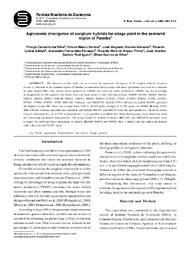Agronomic divergence of sorghum hybrids for silage yield in the semiarid region of Paraiba.
Agronomic divergence of sorghum hybrids for silage yield in the semiarid region of Paraiba.
Author(s): SILVA, T. C. da; SANTOS, E. M.; AZEVEDO, J. A. G.; EDVAN, R. L.; PERAZZO, A. F.; PINHO, R. M. A.; RODRIGUES, J. A. S.; SILVA, D. S. da
Summary: The objective of this study was to evaluate the agronomic divergence of 25 sorghum hybrids (Sorghum bicolor L. Moench) in the semiarid region of Paraiba. A randomized block design with three replications was used for evaluation of plant height (PH), total natural matter production (TNMP) and total dry matter production (TDMP) and the percentage of components of DM (panicle, leaf blade, stem and dead matter) of the following hybrids: 866005, 866019, 866033, 866034, 866035, 866036, 866037, 866040, 866041, 866042, 866043, 866044, 870025, 870031, 870035, 870041, 870051, 870067, 870081, 870085, 870095, 1F305, BRS 610, Volumax, and XBS60329. Hybrid 1F305, followed by hybrid 866034, presented the highest average PH. There was a range from 7.679 to 20.948 kg/ha (average of 13,799 kg/ha) for TDMP. Hybrids 1F305, BRS 610 and Volumax presented less potential, and hybrids 866,041 and 866,042 were the most productive. Based on cluster analysis and subjective cut in 50% of dissimilarity, it was possible to establish four hierarchical groups, from which two stood out concerning productive characteristics. The group formed by hybrids Volumax, BRS 610, and XBS60329 presented lower averages for yield and lower percentage of panicle. Hybrids 866041 and 866042 show a higher total dry matter production, with values around 20,000 kg/ha.
Publication year: 2011
Types of publication: Journal article
Unit: Embrapa Maize & Sorghum
Observation
Some of Embrapa's publications are published as ePub files. To read them, use or download one of the following free software options to your computer or mobile device. Android: Google Play Books; IOS: iBooks; Windows and Linux: Calibre.
Access other publications
Access the Agricultural Research Database (BDPA) to consult Embrapa's full library collection and records.
Visit Embrapa Bookstore to purchase books and other publications sold by Embrapa.

